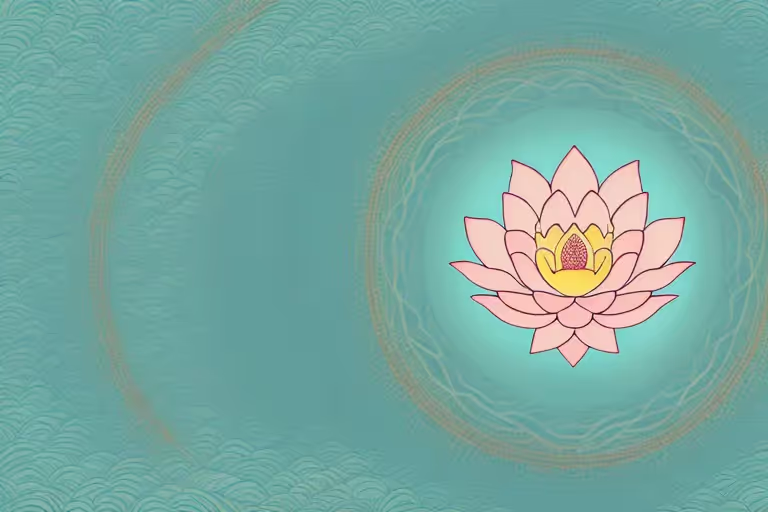Meditation is a practice that is increasingly gaining recognition for its profound impact on the body, mind, and spirit. An integral part of this practice is the use of mantras, powerful tools that aid in enhancing the overall meditation experience. To truly comprehend the significance, purpose, and technique of mantra meditation, it requires delving into its origin, types, role, science, and dispelling some common misconceptions.
The Concept of Mantras
Mantras are typically Sanskrit but can be in any language as they are essentially vibrational formulas that are chanted silently or aloud during a meditation session. They hold a deep spiritual symbolism in their sounds or phrases, enabling the meditator to delve deeper within their consciousness.
When it comes to the concept of mantras, it is important to understand the profound impact they have on the practice of meditation. Mantras are not mere words or phrases; they carry a powerful energy that resonates with the individual's inner being. By repeating a mantra, the meditator creates a harmonious vibration within themselves, aligning their mind, body, and spirit.
The origin and history of mantras can be traced back to the ancient spiritual traditions of the East. They are intertwined with the yoga and meditation practices of Buddhism, Jainism, and especially Hinduism. In fact, the early Vedic scripts regard mantras as an expression of truth that facilitates contact with divine forces.
However, the repute of mantras isn't confined to Eastern philosophies alone. Variations of mantra-like practices can be seen in many global traditions. For example, Christianity has its repetitive prayer of the rosary, which can be seen as a form of mantra chanting. Native American shamanic chants also have a similar purpose of invoking spiritual energies and connecting with higher realms.
Origin and History of Mantras
Mantras hail from the ancient spiritual traditions of the East. They are intertwined with the yoga and meditation practices of Buddhism, Jainism, and especially Hinduism. The early Vedic scripts even regard mantras as an expression of truth that facilitates contact with divine forces.
Throughout history, mantras have played a significant role in the spiritual development of individuals and communities. They have been passed down from generation to generation, carrying with them the wisdom and teachings of the past. The chanting of mantras has been considered a sacred practice, creating a bridge between the material and spiritual realms.
It is fascinating to explore the different cultures and their unique approaches to mantra chanting. In Hinduism, mantras are often associated with specific deities and are used to invoke their blessings and guidance. In Buddhism, mantras are seen as a means to cultivate mindfulness and cultivate inner peace. Jainism, on the other hand, emphasizes the power of mantras in purifying the soul and attaining spiritual liberation.
Aura has the world’s largest and best collection of Meditations and hundreds of Coaches to choose from.
Try it Free!
Different Types of Mantras
Mantras are a realm of their own with vast varieties. Some mantras are chanted for spiritual enlightenment, others for healing, attracting abundance, or for personal development.
There is a plethora of mantras referenced in ancient spiritual texts, each with its own unique purpose and significance. For example, the mantra "Om" is considered the fundamental sound of the Universe in Hinduism. It is believed to represent the essence of all creation and is chanted to connect with the divine energy within and without.
Another well-known mantra is the "Hare Krishna" mantra, which is prominent in the practice of Bhakti Yoga. This mantra is believed to evoke a state of spiritual consciousness and devotion to Lord Krishna. Chanting this mantra is said to bring about inner transformation and a deep sense of connection with the divine.
It is worth mentioning that not all mantras have decipherable meanings. Some mantras, like the "So Hum" mantra, are made up of simple sounds that create a rhythmic vibration within the practitioner. These non-translatable mantras are powerful in their own right, as they transcend the limitations of language and directly impact the subtle energies within.
When choosing a mantra for meditation, it is essential to consider one's intention and desired outcome. Different mantras resonate with different individuals, and finding the right mantra can greatly enhance the effectiveness of a meditation session.
The Role of Mantras in Meditation
Mantras play a crucial role in meditation by acting as vehicles that carry the meditator's awareness from the active, surface level of the mind to the quieter, deeper realms of consciousness.
When a meditator selects a mantra, they are choosing a specific sound or phrase that resonates with them on a personal level. This chosen mantra becomes a focal point for their attention during meditation. By repeating the mantra either silently or aloud, the meditator can anchor their awareness and prevent it from being carried away by wandering thoughts.
But the power of mantras extends beyond their ability to enhance focus and concentration. They also have a profound impact on the mind and body, promoting relaxation and stress relief.
Enhancing Focus and Concentration
Chanting a mantra can significantly assist in channeling wandering thoughts. As such, they can be seen as an anchor that brings back the attention every time the mind starts to drift, thereby improving concentration levels and enhancing focus.
Especially in the beginning phases of a meditation practice, mantras prove to be highly effective in this aspect, facilitating depth and steadiness in the mediation experience.
As the meditator repeats the mantra, they become attuned to its rhythm and vibration. This repetition creates a sense of familiarity and comfort, allowing the meditator to enter a state of flow where distractions fade away and the mind becomes fully absorbed in the mantra.
With each repetition, the meditator's awareness becomes more centered and grounded, enabling them to dive deeper into their inner world and access states of heightened clarity and insight.
Promoting Relaxation and Stress Relief
By immersing one's self in the mantra chanting, the body and mind begin to relax. The repetition inherently creates a rhythm that guides the breath, leading to a state of inner tranquility and calm.
Studies have also shown that mantra meditation can reduce stress levels and enhance overall well-being by promoting a relaxation response that lowers the heart rate and slows down the breath.
During mantra meditation, the meditator's focus on the mantra allows them to let go of worries, anxieties, and the constant mental chatter that often plagues their daily lives. As they surrender to the soothing vibrations of the mantra, they enter a state of deep relaxation where tensions melt away and a sense of peace and serenity fills their being.
Moreover, the repetitive nature of chanting a mantra helps to quiet the mind and release the grip of negative thoughts and emotions. As the mind becomes still and the body relaxes, the meditator experiences a profound sense of relief and rejuvenation.
Ultimately, mantras serve as powerful tools in meditation, guiding the meditator inward and facilitating a profound connection with their inner self. Through the repetition of these sacred sounds or phrases, the meditator can unlock the transformative power of their own consciousness and experience states of profound peace, clarity, and spiritual awakening.
How to Use Mantras in Meditation
Meditation has been practiced for centuries as a means to cultivate inner peace, clarity, and spiritual growth. One powerful tool that can enhance the meditation experience is the use of mantras. A mantra is a sacred sound, word, or phrase that is repeated during meditation to focus the mind and connect with a higher state of consciousness.
Choosing the Right Mantra
When it comes to choosing a mantra, there are various factors to consider. It is a deeply personal process that can depend on individual beliefs, aims, lifestyle, and intuition. The mantra should resonate with one's true self, holding the ability to calm, inspire, and lead the practitioner into deeper meditative states.
While some people may feel naturally drawn to a specific mantra, others may benefit from seeking guidance from a meditation teacher or a spiritual guide. These experienced individuals can provide valuable insights and suggest mantras that align with one's unique needs and aspirations.
As one begins to explore different mantras, it is essential to approach the process with an open mind and heart. Allow yourself to be receptive to the vibrations and energy that each mantra carries. With time and consistent practice, the chosen mantra becomes more than just a word – it becomes a part of one's consciousness, a guiding force on the path of meditation.
Techniques for Incorporating Mantras
Once a suitable mantra has been chosen, the next step is to incorporate it into one's meditation routine. This process requires patience, dedication, and a willingness to explore different techniques. Here are a few popular ways to incorporate mantras:
1. Silent Repetition: Find a comfortable meditation posture, close your eyes, and begin repeating the mantra silently in your mind. Allow the sound of the mantra to permeate your being, bringing focus and stillness to the mind.
2. Chanting Aloud: If you prefer a more vocal approach, you can chant the mantra aloud. Feel the vibration of the sound as it resonates throughout your body. Let the rhythm of your voice guide you deeper into a meditative state.
3. Syncing with the Breath: Another technique is to synchronize the mantra with your breath. As you inhale, silently or audibly chant one part of the mantra, and as you exhale, chant the other part. This rhythmic repetition creates a harmonious flow between the breath and the mantra, fostering a sense of unity and tranquility.
Regardless of the technique you choose, the key is to practice regularly and consistently. As you repeat the mantra, its meaning and sound become ingrained in your consciousness, gradually leading you beyond the realm of thoughts and into a state of profound stillness and inner peace.
Remember, the journey of meditation is unique to each individual. Embrace the power of mantras as a tool to deepen your practice and discover the transformative potential that lies within.
The Science Behind Mantras and Meditation
Psychological Effects of Mantras
Scientific studies have shown that regular mantra meditation can have profound psychological effects. It assists in relieving symptoms of stress, anxiety, and depression by helping to bring about a state of mindfulness.
Moreover, repeating a mantra has been linked to improved memory and concentration, as well as increased self-awareness and a greater sense of purpose.
Physiological Benefits of Mantra Meditation
The benefits of mantra meditation also extend to physical health. Research indicates that it can lower blood pressure, strengthen the immune system, and even slow down the aging process.
In terms of neuroscience, chanting a mantra regularly could also lead to the formation of new neural pathways, contributing to greater mental agility and resilience.
Common Misconceptions About Mantras
Debunking Mantra Myths
Contrary to popular belief, mantras are not confined to any one religion or spiritual practice. They are universal, and their effectiveness is dependent more on the practitioner's intent than the letter of the chant.
Another common misconception is that one needs to sit for hours chanting a mantra for it to be effective. In reality, even a few minutes daily can be beneficial.
Understanding the True Purpose of Mantras
The ultimate purpose of a mantra goes beyond its surface-level benefits. It is a tool for transforming consciousness, transcending the limitations of the mind, and experiencing the oneness of existence.
Giving respect to the mantra and practicing regularly with sincerity and dedication is key to reaping its myriad benefits.
That being said, incorporating mantras in your meditation practice can significantly elevate your journey toward self-awareness and tranquility. To aid this journey, incorporating tools like the Aura Health app can prove beneficial. Aura helps to streamline the practice by offering guided meditations, soothing music, life coaching and more to help maintain a regular meditation schedule and experience its myriad benefits.
Start today, and let the wisdom of mantras illuminate your path to inner peace and self-discovery.
Aura is Your All In One App for Meditation, Mindfulness Wellbeing
Find peace every day with one app for your whole well-being. There is no one-size-fits-all solution to mental well-being. Aura is the first all-in-one wellness app that learns how to best help you. Discover an endless library of expert-created tracks for your well-being, all taught by the world’s best coaches, therapists, and storytellers. With Aura's personalized recommendations, you can find peace every morning, day and night.
Aura has the world’s largest and best collection of Meditations and hundreds of Coaches to choose from.



.webp)






.avif)

%20(1).avif)


.avif)
.avif)
.webp)


.avif)


















































































































.avif)

















.svg)









